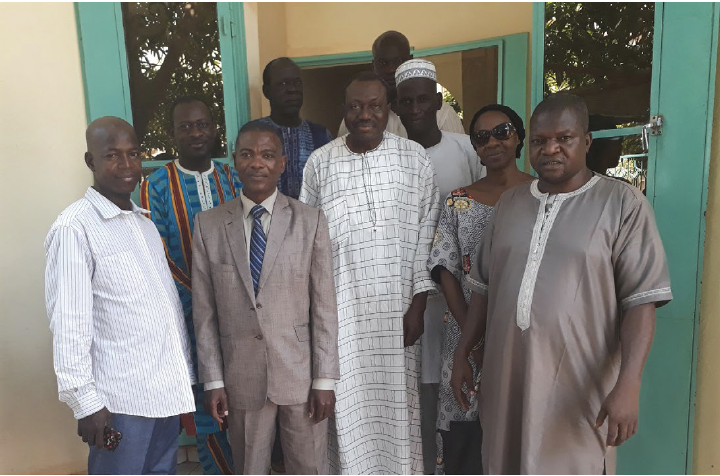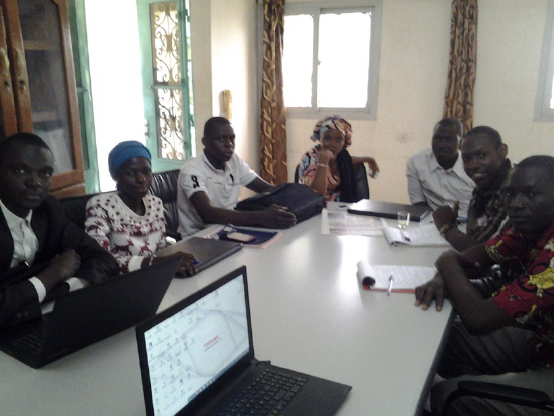For over thirty years, the Department of Agricultural, Food, and Resource Economics (AFRE) at Michigan State University has maintained an active presence in Mali, working with local colleagues to improve the country’s food and nutrition security and agricultural policy research capacity. Another chapter of this long-standing story came to an end in April of 2021 with the completion of the Mali Food Security Policy Research Program, known in French as “Projet de Recherche sur les Politiques de Sécurité Alimentaire au Mali” (PREPOSAM). Funded by the United States Agency for International Development, PREPOSAM was established in 2016 through a sub-award of the Feed the Future Innovation Lab for Food Security Policy (FSP).
PREPOSAM was led by three members of AFRE’s Food Security Group: Associate Professor Veronique Theriault, Professor Melinda Smale, and Professor (now emeritus) Steven Haggblade. On-the-ground activities in Mali were managed under the leadership of the project coordinator, Dr. Yenizie Kone and were implemented in collaboration with Malian research partners and institutions.

“From the outset PREPOSAM’s mission was threefold’” says Smale, “to promote improved food security policies, to identify evidence and analytical gaps in existing policy, and to build Malian agricultural policy research capacity.”
To achieve these goals, the project prioritized five policy areas: 1) agricultural inputs, 2) agricultural trade, 3) agri-business investments, 4) cross cutting issues (i.e., gender, youth, and nutrition) and, in its final year, 5) COVID-19.
Improving Food Security Policy
PREPOSAM successfully implemented multiple food security policy research studies, including on the fertilizer subsidy program, pesticide markets and regulations, seed policy, trade barriers, and retailing of processed food, including dairy products.
Notable findings from the research on fertilizer subsidies in Mali include the limited use of e-vouchers, gender disparities in subsidy access, and empirical evidence that subsidies incentivize farmers to allocate more land to target crops (i.e., cotton, maize, and rice), at the expense of crop diversity and crop nutritional value.
In analyzing Mali’s pesticide markets and regulations, the researchers found that growth of the pesticide market has outstripped government oversight. Without strong regulation of the market, fraudulent pesticides are now sold widely throughout Mali. These finds are concerning because fraudulent pesticides can be harmful to humans and the environment. Theriault says, “Farmers can protect their crops, consumers, and themselves by only purchasing pesticides that are duly authorized by the Comité Sahélien des Pesticides (CSP).”
Other key research findings include the low adoption rate of improved sorghum seeds, long-term benefits of removing trade barriers, and great opportunities for processed food made from locally-sourced ingredients, particularly for the Malian dairy industry. Concrete policy changes and investments based on these findings could lead to lasting improvements in Mali’s food and nutrition security outlook.
Theriault says, “In addition to providing needed empirical evidence on the five priority policy areas, PREPOSAM has been committed to sharing key findings directly with policymakers and stakeholders, including Malian farmers. In 2020, our village outreach program reached over 300 farmers.”
Building Capacity
Beyond research, capacity building has been an essential component of PREPOSAM’s efforts in Mali. The program included both short-term professional development trainings and long-term student trainings for Malian undergraduate and graduate students. Professional development offerings included workshops on survey methods, multi-market modeling, and the “kaleidoscope” policy model which helps identify and promote the confluence of conditions that can lead to policy impact. Long-term student trainings focused on data collection, analysis, writing, and dissemination.

After one of the program’s training sessions a student noted, “This training was a great mind opener, and an opportunity to learn statistical software and reliable comparative research methods for economic development.” Another student said, “From now on, I’ll be able to accurately perform data analysis.”
Looking Forward
For the PREPOSAM team, the end of the project has been bittersweet. Theriault says, “On the one hand it is great to look back on the project and reflect on its successes, but there is also more work to be done.” Looking toward the future, Theriault sees a continued need to improve Mali’s food and nutrition security, revisit agricultural input policies, promote sustainable agricultural practices, improve diet diversity in both urban and rural areas, and improve the monitoring of pesticides.
Food Security Group Co-Director David Tschirley says, “The PREPOSAM team carried AFRE’s legacy of engagement in Mali forward with great success. The research produced and the capacities that were developed under the program will continue to inform Mali’s agricultural policy decisions in the years ahead and leave lasting improvements on the country’s food security outlook.”
While PREPOSAM has come to an end, the work in Mali continues for Theriault and Smale through two separate agricultural policy research projects supported by the Feed the Future Innovation Lab for Legume Systems Research.



 Print
Print Email
Email